From a 3D-printed eye wash cup to potentially printing human lungs, Chuck Hull, ‘59, has been at the forefront of innovation for decades.
Hull created stereolithography, also known as 3D printing, in 1983. His continued successes contributed to him receiving the National Medal of Technology and Innovation in October 2023.
The award is an honor granted by the President of the United States to American inventors and innovators who have made significant contributions to the development of new technology.
“It’s obviously really humbling because of the consideration that goes into it before that’s awarded … so it kind of puts you in a league that’s pretty high,” Hull said.
Past awardees include Steve Jobs and Steve Wozniak for their development and introduction of the personal computer and Gholam A. Peyman for the invention of
the LASIK surgical technique.
After attending CMU, Hull attended the University of Colorado and then worked for DuPont and Ultraviolet Products. While head of technology for Ultraviolet Products, he was introduced to ultraviolet curable plastics — liquid materials that become solid pieces of plastic after exposure to ultraviolet light.
“In our case, we were working on coatings for furniture and that sort of thing,” he said.
Hull wanted to see if he could manipulate the materials to be “actual plastic parts” rather than coatings for furniture pieces.
“The innovation then was figuring out stereolithography, using those kinds of materials, ultraviolet light and basically 3D print parts,” he said.
His discoveries created an entire industry in 3D printing and resulted in the establishment of his own company, 3D Systems, in 1986.
“You either have to be, or have to learn to be, innovative,” said Hull. “Because progress is always made through change, so ‘How do I innovate a change that’s going to make sense?’ And then there’s typically an invention part of that because, ‘Hey, now you’re talking about things that don’t exist.’ So what do we need to exist? What’s the process to think to make something exist? So I always try to tie together the enterprise, innovation, invention.”
Now, he’s working on human lungs. Martine Rothblatt, president of United Therapeutics, contacted Hull about printing the organs. The company had been studying how to create lungs at a lab in North Carolina.
Hull immersed himself in the research for that field in order to understand the difficulty of the problem as well as the immense value solving it could bring to the world.
